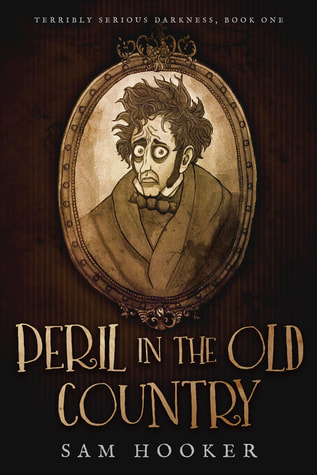|
I received a review copy of this book from the publisher. Panic in the Old Country by Sam Hooker will be released on June 5, 2018.
I’ve read that a good way to set up a story is to establish what a character is good at and make him do something else. Peril In the Old Country by Sam Hooker uses that method with malicious glee. Sloot Peril’s chief skills are accounting and flying under the radar are of a capricious and murderous government ruled by the tyrannical Domnitor, long may he reign. Sloot is a nervous, cowardly man adept in navigating a Kafkaesque dystopia that reads like a combination of 1984, Papers Please, and Paranoia. He’s stricken by learned anxiety and alternates between resigned fatalism and undignified panic. The humor is almost entirely driven by Hooker’s knack for describing how impossibly bleak and abusive the setting is, along with Sloot’s complete inability to cope. In the early chapters, Sloot recieves an unfortunate promotion that places him in a new job as the financier of Lord Wilhelm “Willie” Hapsgalt, a foppish man-child of a noble who has been six years old for the past 36 years (He has a birthday coming up. He’s going to turn six.). This sparks a long series of fresh tortures for Sloot, from having to stand up to his own employees to visiting the Old Country’s hated neighbor Carpathia, a land of astoundingly violent and dangerous savages (if you believe the Ministry of Propaganda, and it’s inadvisable not to). He doesn’t even allow himself the space to question the insanity and injustice of his world, and it’s strangely endearing to watch him struggle along in a world where even wearing the wrong shoes to stand in line can earn you a roughing up and swear words summon goblins. It’s also a spy story. Early on, Sloot is recruited, much to his chagrin, by a spymaster named Roman and is caught in a criss-crossed web of conspiracies, which brings him no end of stress. This is comedic fantasy starring a craven protagonist, so the comparisons to Discworld’s Rincewind are inevitable, but I would argue that this book reads more like a parody of Robin Hobb’s Assassin’s Apprentice. Like Fitz, Sloot is just a man trying to get by in a crapsack world and find a little happiness while suffering through an endless parade of torment. Roman is a smarmier, more secretive Chade who delights in Sloot’s ignorance. Lord Wilhelm is as foppish and hedonistic Prince Regal, minus the villainy. There’s even a painfully awkward romance that Sloot can’t help but undermine with his cowardice and awkwardness. If you’re a fan of books that treat their protagonists like chew toys at a doggie daycare, “Panic in the Old Country” is the parody for you. I had two major complaints about this book. First, Hooker describes a culture of kilt-wearing, red-bearded barbarians known for their love of **whiskey** (He spelled whisky with an [e]! Get him!). Second, I found the ending abrupt and unsatisfying. I don’t want to say more for fear of spoilers. Hooker never misses a beat when it comes to describing the terrors and abuses of his world. For my comedy reviews, I like to pick a few particularly funny quotes from the early chapters to give an impression of the sense of humor while avoiding spoilers. In “Peril in the Old Country,” however, Hooker was on fire from the start and I had trouble deciding on which quotes to pick just from Chapter 1. The first chapter really sets the tone and establishes Sloot, the setting, and the sense of humor nicely. "It looked into another apartment within arm’s reach, which was occupied by a man who looked remarkably like Sloot. Curtains might have provided them both some amount of privacy, though they’d also have robbed them both of any natural light that managed to elbow its way between the two buildings on occasion, and into their respective apartments. Their unspoken compromise was just to ignore each other, hence no name is available to give for this neighbor, who will probably never be mentioned again." *** "While he was still in school, when the class had finished the recitation, the teachers had the children turn and slap each other across the face so they wouldn’t forget. Sloot had never been sure what he was supposed to do about it now that he did his recitation on his own, so he slapped himself just to be on the safe side. He reasoned that he was far too old not to know, and didn’t want to slip up if anyone were watching. Sloot had spent his life up to that point nurturing an utter dearth of “self-confidence,” a term he believed had been invented by guidance counselors who truly enjoyed lying to people. In any case, the slapping seemed to be working. He was nearly forty, and heresy had yet to creep into his mind." *** Vasily’s work was consistently abysmal, so it was reported to his father—a very affluent shareholder in the Three Bells—that his son’s work was nothing if not consistent.
1 Comment
|
Review PolicyArchives
August 2018
Categories |


 RSS Feed
RSS Feed
